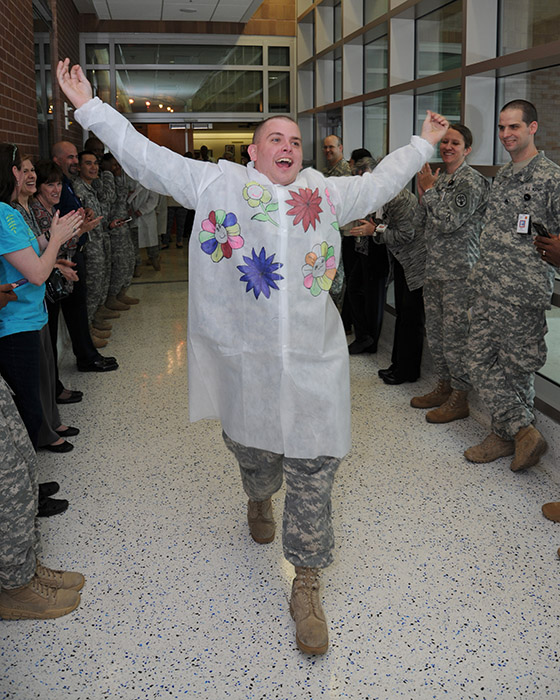USAISR observes Medical Laboratory Professionals Week

The Commander of the U.S. Army Institute of Surgical Research, Col. (Dr.) Michael D. Wirt proclaimed April 20-24 as Medical Laboratory Professionals Week. During the MLPW proclamation signing ceremony April 20 at the Soldiers formation, Wirt read the Commander's Proclamation.
"Medical Laboratory Professionals Week is a time of recognition for the medical laboratory professionals and board-certified pathologists who play a vital role in every aspect of healthcare," said Wirt.
Since 1975 MLPW has been observed during the last full week of April and is designed to provide the profession the opportunity to raise public awareness, appreciation and understanding of laboratory employees.
Staff Sgt. Khanesha Murrell and personnel at the Comparative Pathology Branch of the USAISR Laboratory Support Section planned daily activities including trivia games, a lab coat decorating contest, Lab Olympics and a scavenger hunt. The final event will be a brunch where the winners of the week-long festivities will be awarded prizes.
"Beyond meeting this public need, the celebration of MLPW will increase recognition for the profession as it improves the individual practitioner's sense of self-worth," said Staff Sgt. Gina Chang, non-commissioned officer in charge of Laboratory Support Section. "Further, as the various professional groups within laboratory practice work together on this project, the sense of unity and purpose necessary to further the goals of the scientists are reinforced."
There are six research areas at the USAISR where medical laboratory professionals are assigned including bone tissue injury, clinical trauma, hemostasis, resuscitation, soft tissue injury and trauma informatics.
Chang added that as team members of one of the largest industries in the United States, the dedicated efforts of laboratory professionals often go unnoticed by the general public, as well as by the very institutions employing their services.
"With the public now demanding the assurance of quality healthcare and professional accountability, organizations representing practitioners of this critical science have a responsibility to ensure that the public is well informed about laboratory competence," added Chang.
 An official website of the United States government
An official website of the United States government
 ) or https:// means you've safely connected to the .mil website. Share sensitive information only on official, secure websites.
) or https:// means you've safely connected to the .mil website. Share sensitive information only on official, secure websites.


